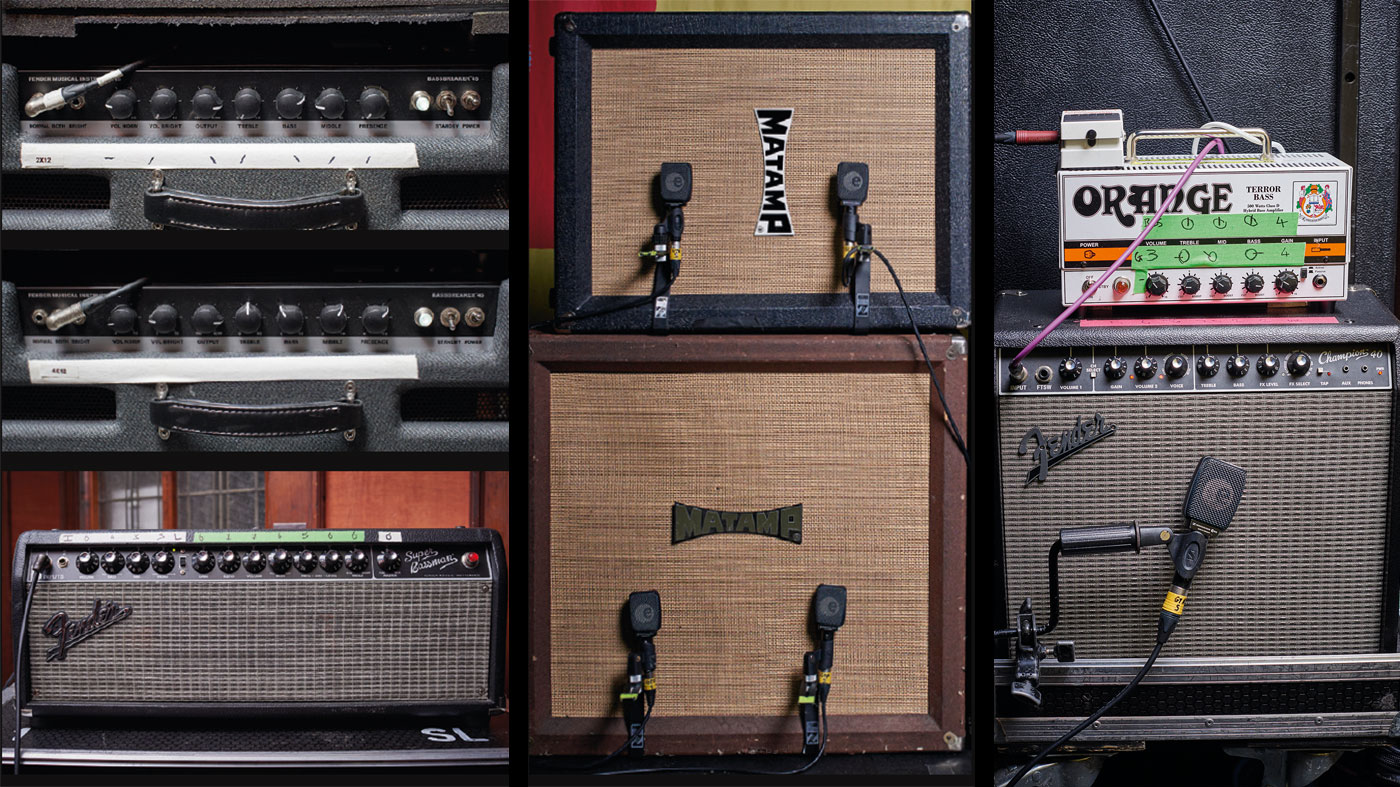Slaves' Laurie Vincent on Take Control, Mike D and his mammoth guitar rig
Behind the scenes with the UK punk duo
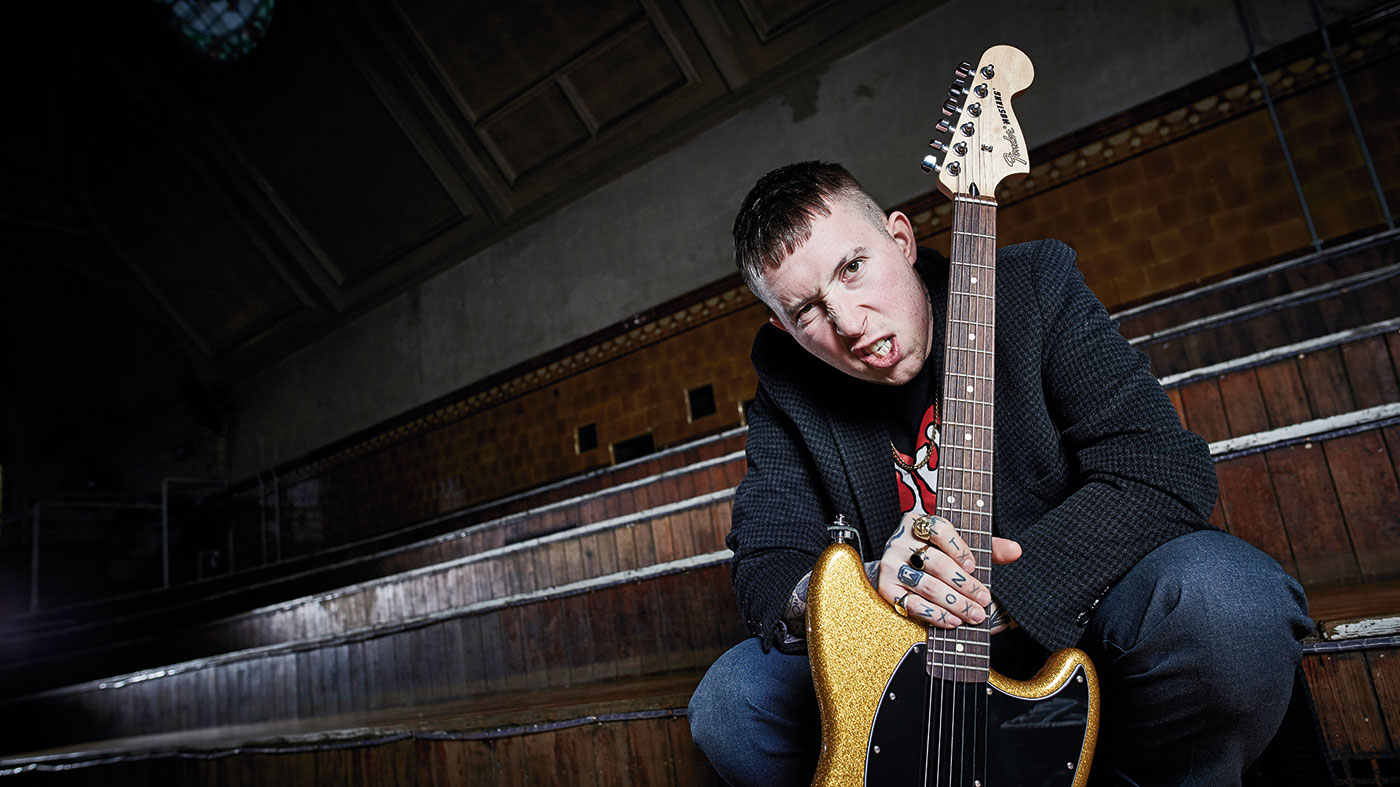
Introduction
Kent duo Slaves are successfully prodding a pacified rock scene. All they need is an errant Beastie Boy, a stack of riffs and a ludicrous amount of amplifiers…
"Er, could I have a mint tea, please?" We're sat in the Gothic back room of Manchester’s grand Albert Hall with Laurie Vincent, guitarist with the UK’s best contemporary punk band, Slaves.
Laurie is a graduate of the Joe Strummer school: an earnest-type, trying to speak clearly in an industry that is prone to inflate
He has a thick Kent accent, a spider web tattoo covering a half-shaved head and impeccable manners. His band, a two-piece completed by drummer/vocalist Isaac Holman, make a sound that’s somewhere between malfunctioning heavy machinery, Crass and Jamie T, although that remit has been considerably expanded of late.
Across the big leather sofa on which he dwells, Laurie’s pregnant wife, Emma, is sitting with her feet up. She’s due “in 1.5 weeks” and is touring the UK with the band. It’s a scene of domestic bliss, albeit one that revolves around the mechanics of nightly headline shows. Emma has recently had a baby shower and Laurie is still smarting.
“They all came round, trashed my house and I had to clear it up,” he says, sounding somewhat aggrieved. “They did bring gifts, though, so I am grateful.”
Much has been written about how Laurie is surprisingly pleasant, given his Oi! stylings and boisterous noise preferences, but this says a lot more about the assumptions and prejudices of journalists than the man himself.
We must admit we like him immediately, but it’s more accurate to think of Laurie as a graduate of the Joe Strummer school of rock stars: an earnest-type, trying to speak clearly in an industry that is prone to inflate and complicate.
I was quite aware that, to be a band like us and do two albums on a major label without getting dropped was quite rare
Laurie and Isaac’s message is getting through, though. Slaves prodding, abrasive first album Are You Satisfied? debuted in the top 10 and received a Mercury nomination. Their second, 2016’s Take Control, produced by Beastie Boy Mike D - who asked for the job - has upped the weirdness, incorporating metal riffs, electronic elements and a 44-second tune called Fuck The Hi-Hat, yet still peaked at number 6 in the charts.
“Coming out of the first album with such critical acclaim or whatever, we were confident, but I think we held back a bit,” says Laurie. “Isaac’s rapping on this album and there’s songs with keyboards and we just went for it. I was quite aware that, to be a band like us and do two albums on a major label without getting dropped was quite rare, so [I thought] ‘Let’s use this time to fuck around.’”
Don't Miss
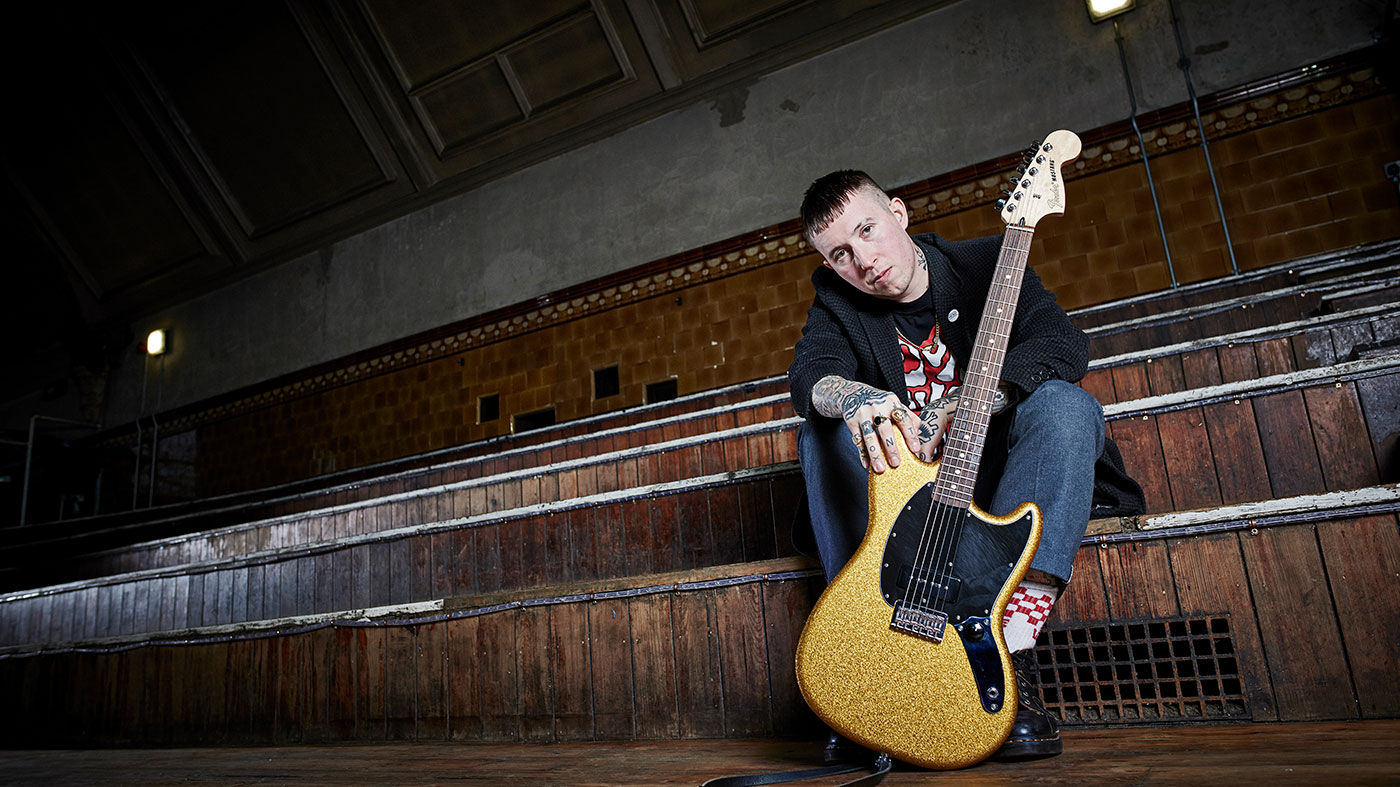
Exposing the myth-making
As such, Take Control’s third track, Consume Or Be Consumed, with it’s opening line, “I’ve got the whole fucking scene on my dinner plate”, is a pretty apt description of the stylistic approach of the record.
“There are songs where we went more hip-hop, but there are songs like Play Dead that just sound like a Black Sabbath riff , so we just embraced everything.” explains Laurie.
It doesn’t bother me if it sounds shit. I don’t have any embarrassment. I just keep going until I find it
“It’s like when you first start playing guitar: you consciously make an effort to have all your songs sound like you’re in a certain band, but one day you realise that everything you play just sounds like you, because your fingers and the way you play have a sound. That’s when it gets better. We just thought, ‘We’re going to put whatever we want on this album.’”
Slaves songs are bold, bright and sometimes straight-forward to a fault, but they’re designed to do a job: whether that’s as an outlet for aggression, documenting stories, or verbally head-butting a UK public that they see sleepwalking into self-destruction.
Not everyone likes them: some publications have criticised Isaac’s use of clumsy female stereotypes, others just seem to find Slaves’ cartoon punk-rock vision enraging - unbefitting of an anarchic legacy. The reverse of the argument is that Slaves are embracing the ludicrous and purposefully demystifying the creative process.
“I sort of pick it up. I don’t really ever have anything in my head,” says Laurie, honestly, if offering a bit of a gift quote to his detractors. “I’ll just play anything and sometimes I stumble across things. I don’t ever sit there and think ‘How are you going to do this?’
Slaves are embracing the ludicrous and purposefully demystifying the creative process
“It doesn’t bother me if it sounds shit. I don’t have any embarrassment. I just keep going until I find it. Also, a lot of my songs are attempts to rip off other songs. When I wrote Cheer Up London, I was trying to copy the bassline from Guns Of Brixton, but I couldn’t work it out.”
This kind of admission is anathema to those who regard writing and playing as a holy process of self-flagellation. Most rockstars like to spout self-aggrandising crap about writing that ultimately mystifies the process and puts people off having a go for themselves.
Slaves do not. They represent punk in its original form - as an approach that combines conviction, experimentation and knowing humour. Isaac’s terrace-chant lyrics might seem simple then, but there’s a knowing wink in the way he simultaneously rubs his critics’ noses in his success.
“I know a man called Michael. He hails from NYC. Now he lives in Malibu, in a mansion by the sea,” deadpans Isaac on People That You Meet. “Production is his game now. He called my friend Laurie. He used to be a Beastie Boy - but now he works for me.”
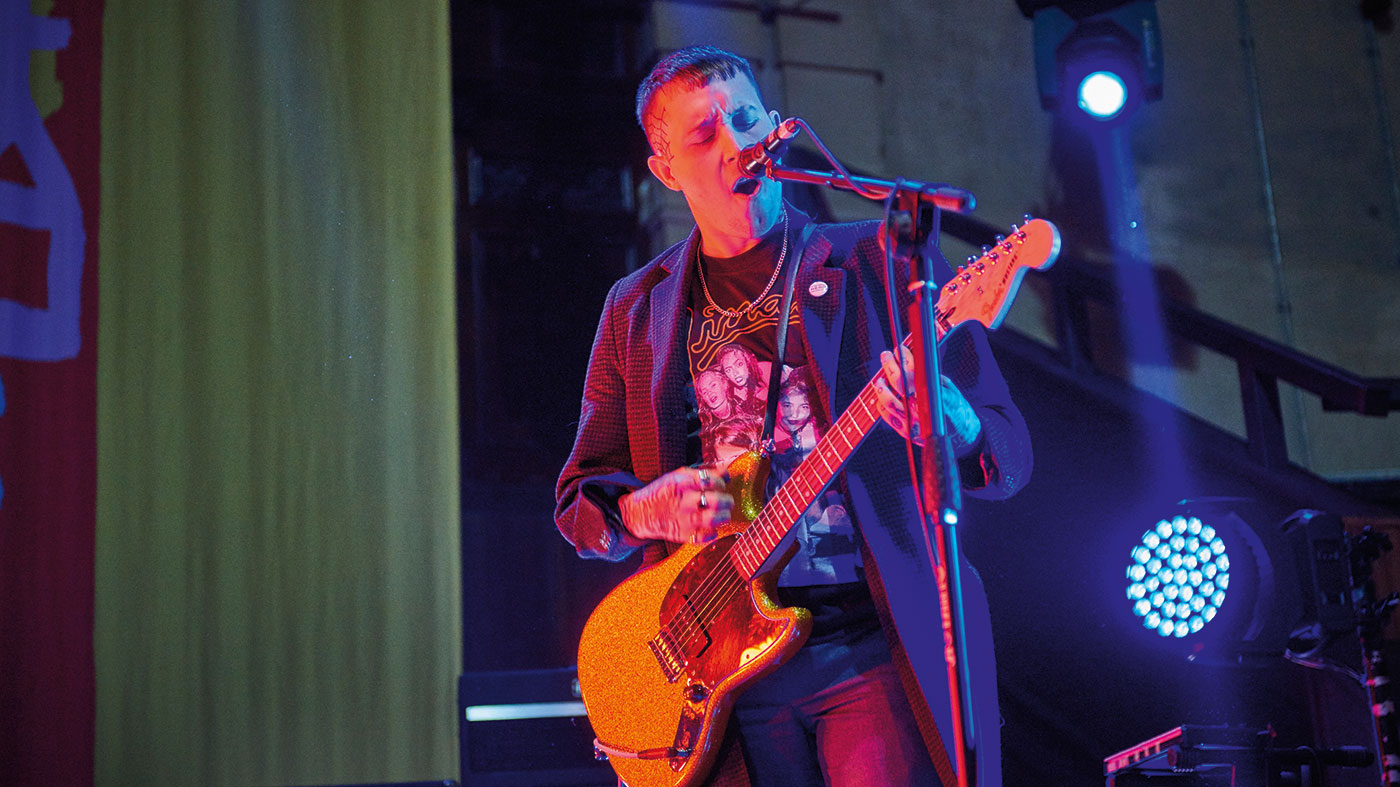
The next stage
“One of the biggest things you get when you work with someone like Mike D is confidence,” says Laurie.
“To know that someone with such a prestigious background rates what you’re doing, you feel like you’re doing something good. Mike cared so much, but he didn’t have that gauge where he was trying to make it as good as the last one. Whereas a new producer might be more like, ‘Ah, I really feel like we need another song like Cheer Up London…’”
It’s about trying to make the album sound interesting and not trying to kill yourself by doing loads of different stuff on stage
It’s important to Slaves that they don’t just rest on their laurels. The duo format has obvious economic and creative benefits for a new band - decisions can be made quickly, there are less mouths to feed on tour and songwriting is at most a two-way process - however, it’s restricting in other ways.
“Definitely,” agrees Laurie. “But the more you practise any musical instrument, the better you get at it and I think that, two albums in, I feel a lot more competent. [The problem is] I start hearing more stuff , which is harder to achieve. So it’s about trying to make the album sound interesting and not trying to kill yourself by doing loads of different stuff on stage.”
The guitar riff on Lies is a prime example. “With that one, I sort of made a new way for me to play,” says the guitarist. “I was trying to make my guitar sound like Gang Of Four, where they have the bass and the guitar intertwining, but they never play at the same time. So I was playing some bass notes with my thumb and then jangly bits with my fingers and that song just sort of came out. Everyone that I played it to originally was like, ‘Who’s doing the bass?’ And I was like, ‘No, it’s me!’”
To convey a convincing bass tone on the sizeable stages that Slaves are now playing takes a considerable rig. The guitarist tours with a four-amp set-up of two Fender Bassbreakers, a Bassman and a Champ. And while you could be justified in crying ‘hypocrite’ at a man who supposedly prizes simplicity but uses a tower of trouser-flappers, there is a certain straightforward logic to it all.
Essentially, Laurie’s stack is a four-band EQ in amp form: the Bassman occupies the lowest reaches, the two Bassbreakers are split between lower- and upper-mids and the Champ supplies the high-end sparkle.
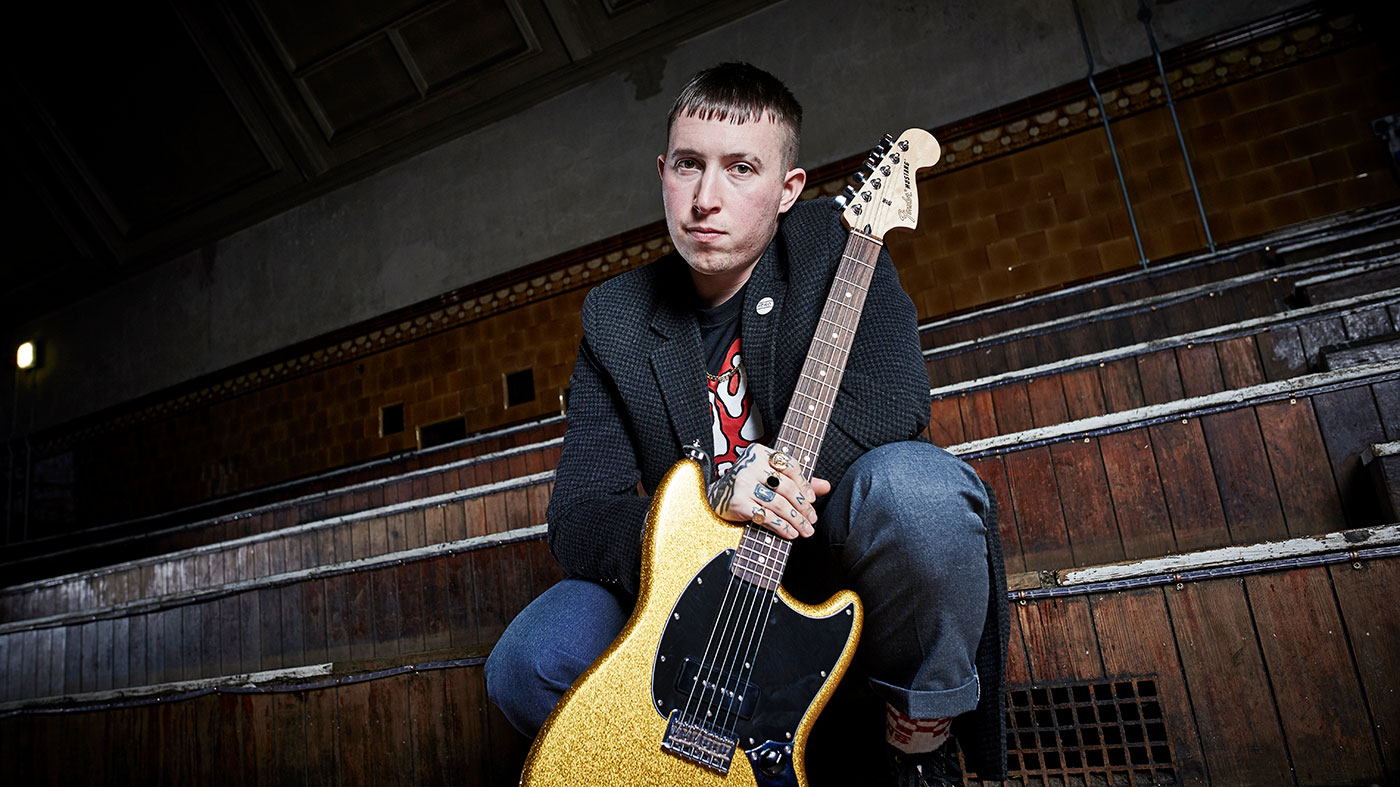
These hands
“I used to write songs in the same format so all of the verses would be without the bass amp and in the choruses it would come on,” he explains.
“But now I do things like, in Sockets, where all of the amps are always on. That’s why I say to people you can take photos of my gear, because no-one will ever use it the way I use it. It doesn’t bother me.”
Ben, my tech, will play my guitar and I’ve realised that if you don’t have my hands, you won’t sound like me
In our experience, guitarists in duos are often particularly guarded about their tonal secrets. We tell Laurie that Royal Blood’s Mike Kerr, for instance, was very protective of his pedalboard when we spoke to him.
“It’s pointless, isn’t it?” responds Laurie. “Ben, my tech, will play my guitar and I’ve realised that if you don’t have my hands, you won’t sound like me. That’s pretty much it. The amount of pressure and attack you use is crucial to your tone.”
At the heart of the rig is a Carl Martin Octa-Switch, which Laurie uses to switch between various preset combinations of distortions, modulation effects and amps.
“I don’t like muddy sounds, which seems weird,” he acknowledges, given the proliferation of amps piled atop one another. “But I feel like all of my distortion section, even when it’s at its peak, you can still hear the notes.”
What’s compelling about Slaves’ tone, particularly given the new electronic elements, is how it can seem technicoloured and consistent all at once. A bit like a modern art, it seems so easy that you immediately think ‘Well, I could do that…’ The point being, of course, that you didn’t…
It’s quite hard to do something original but we’re as close to it as I think you can get
“If you’re a painter, there’s only a certain amount of colours you can have and then you need to mix them together,” says Laurie of his setup. “And that’s where I’ve got to with my guitar pedals and with my amps as well. They’re at a point where I feel like I’ve got a really big palette and I can pretty much get any sound I want by mixing it all together.”
Of course, at this point, Slaves could quite easily pull a Black Keys, hire a bassist, save themselves a considerable headache and save us from printing anymore of this chin-stroking liberal arts nonsense, but convenience was only ever half the point.
“I guess it’s the idea that, when I was growing up, you needed to find your bassist, your drummer and your frontman,” says Laurie. “But I feel quite happy that we didn’t just do that. It’s quite hard to do something original but we’re as close to it as I think you can get. We drew a lot of influences from other things, but I think more people should go [that route]. You should just do whatever you want.”
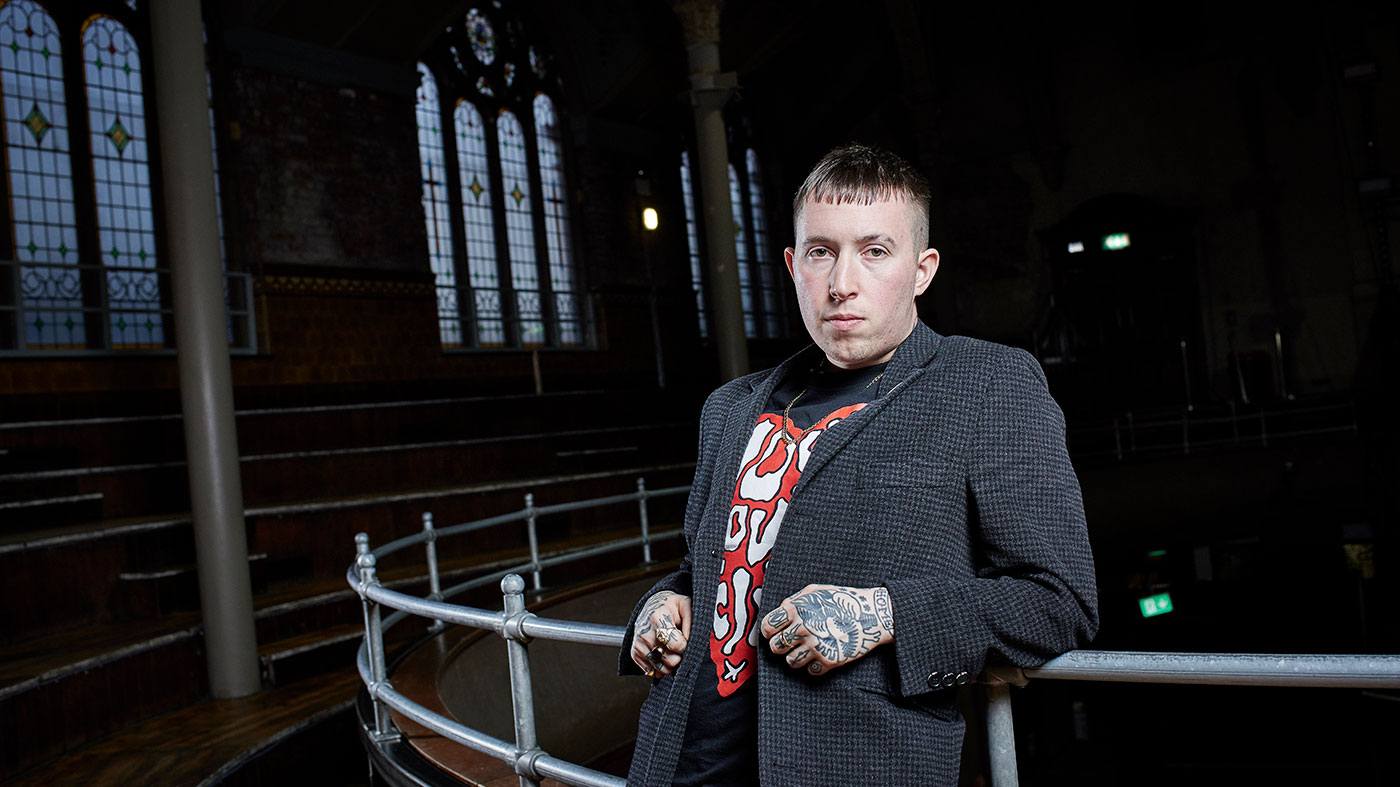
Do something
Slaves’ own manifesto then was always to encourage the apathetic to just get up and do something. Songs such as Despair And Traffic and Cheer Up London from Are You Satisfied? asked awkward questions of a population of wage slaves and smartphone junkies.
Against the current global backdrop, that head-burying has worsened considerably since their first album. What does that do to their resolve?
I just feel like there’s this un-swaying population that are just on Facebook. Like we’re being kept stupid on purpose
“You definitely feel a bit jaded,” admits Laurie. “It’s so harsh, but I feel like [the concept of] proles from 1984 is more relevant than ever. These people that just watch reality TV and all they can talk about are each other and what Christmas presents they’re buying - and it just drives me nuts.
“They’re people that voted ‘out’ in Brexit and didn’t really think about the consequences. They’re happy not knowing. Ignorance is bliss, innit? I just feel like there’s this un-swaying population that aren’t actually engaged and are just on Facebook. Like we’re being kept stupid on purpose.”
With Emma back in the room following a trip to the merch stand of this evening’s support band, we are prompted to ask how Laurie feels about the future, now he’s due to become a father.
“Frustrated,” is the answer. “I feel very conscious to be making them aware from a young age that they need to be switched on. For every generation, the problems are getting closer and closer. We can all bury our heads in the sand, but shit’s happening. The divide is getting bigger. But I feel inspired that our kid gets to grow up around us. That I get to play a role in shaping that [future].”
Bad times lead to good creativity, so I would hope more people are creative and do stuff they want to do. That they don’t just fall in line
For all Slaves’ dystopian lyrics, angry ‘personal politics’ and bleak riffs, Laurie has a cautious optimism that is quite infectious. If he’s going to have the brass balls to actually talk about this stuff in public - as opposed to being cowed by the enormity of the task, endless trolling or the prospect of poor PR - he better have a plan. What will have to happen in the world for Slaves to feel they’ve achieved their mission? That picking up a guitar helped him make a difference?
“I don’t know, ” admits Laurie. “I think we’re just another band posing a question. But it would be cool to see more bands coming out and making statements. Bad times lead to good creativity, so I would hope more people are creative and do stuff they want to do. That people are pissed off and they don’t just fall in line.” Consider this a call to arms, then.
Slaves’ second studio album, Take Control, is available now on Virgin EMI Records.
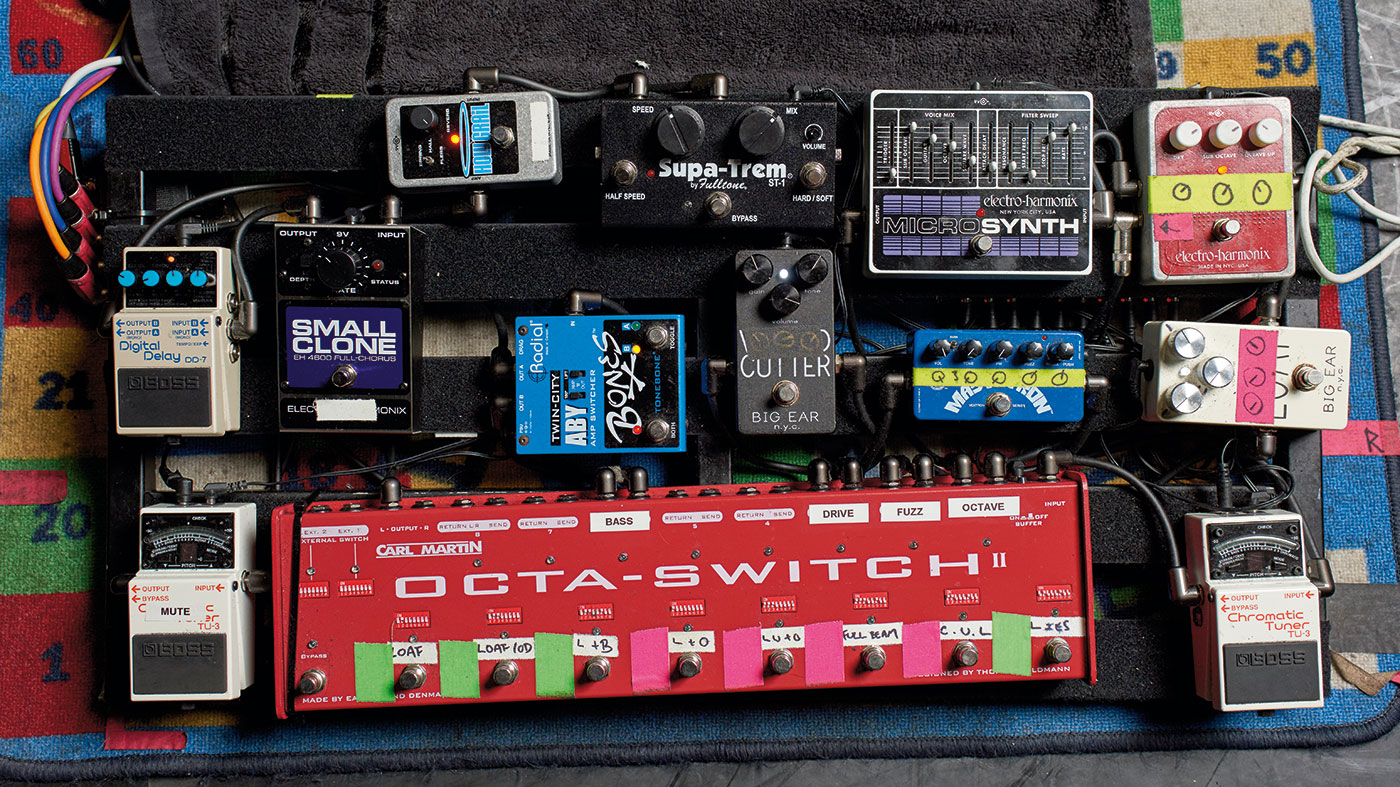
Laurie's rig: pedalboard
Carl Martin Octa-Switch
“This has all the presets in it, so I’ll have fuzz and distortion, then the octave section, which is the same but it with octave on each, then a clean section.”
Electro-Harmonix Micro POG
“It’s all about simplicity, really. I don’t like the POG, because it’s got too many controls, I like the Micro POG, because it’s simple. I just really like things to have ‘louder’ and ‘tone’ [controls] and that’s it.”
Electro-Harmonix Micro Synth
“It’s called ‘Full beam’ that pedal. We write that on it, because it’s like the loudest it goes in the set, with the Micro Synth and the bass amp on single notes.”
Big Ear NYC Loaf & Woodcutter
“We were in Austin and my [Fulltone] OCD broke, and the guy who does these gave me a Loaf [silicon fuzz] and a discount on the Woodcutter [distortion]. So it was through necessity at first, but then I was like, ‘That sounds cool’ and it stuck.”
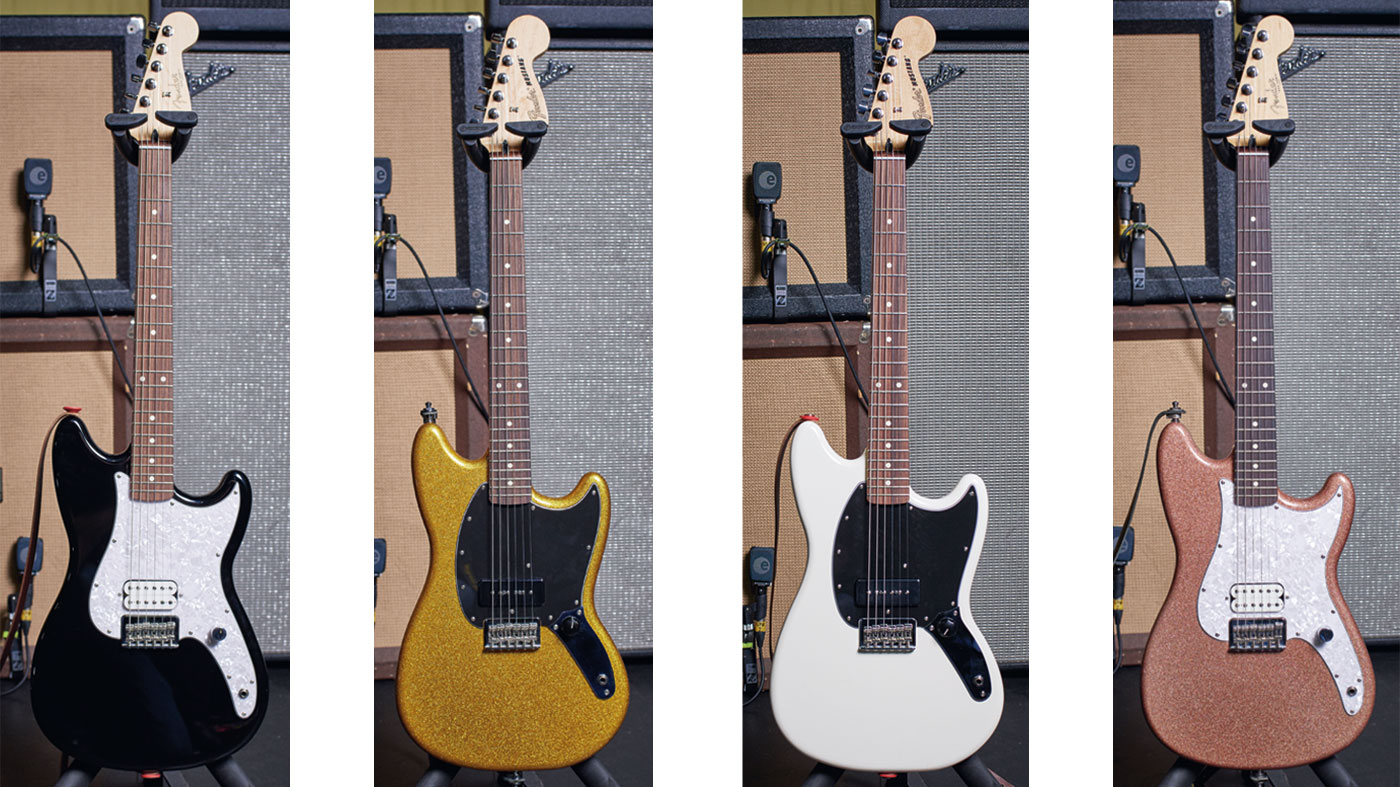
Laurie's rig: Custom Fender Offsets
“I’ve got four custom Offsets. They’re the same as the Offset series, but I don’t have a neck pickup or a tone knob.”
Humbuckers
“I’ll use humbuckers when it’s just a punk song, so if it’s got chords and there’s not much single-note playing. Basically, when I just want power, I’ll use that.”
P-90s
“I’ve never been able to play P-90s until now, because if you’re playing a club, it’s just gonna scream, but if you’re in a lucky position like me, they sound brilliant.”
Split nuts
“I use really big strings, [Ernie Ball] Not Even Slinkys [0.056-0.012 and ‘optimised for detuning’ - Ed], so I just split nuts. This tour’s ridiculous. I’ve split like four or five!”
Don't Miss
Matt is a freelance journalist who has spent the last decade interviewing musicians for the likes of Total Guitar, Guitarist, Guitar World, MusicRadar, NME.com, DJ Mag and Electronic Sound. In 2020, he launched CreativeMoney.co.uk, which aims to share the ideas that make creative lifestyles more sustainable. He plays guitar, but should not be allowed near your delay pedals.
